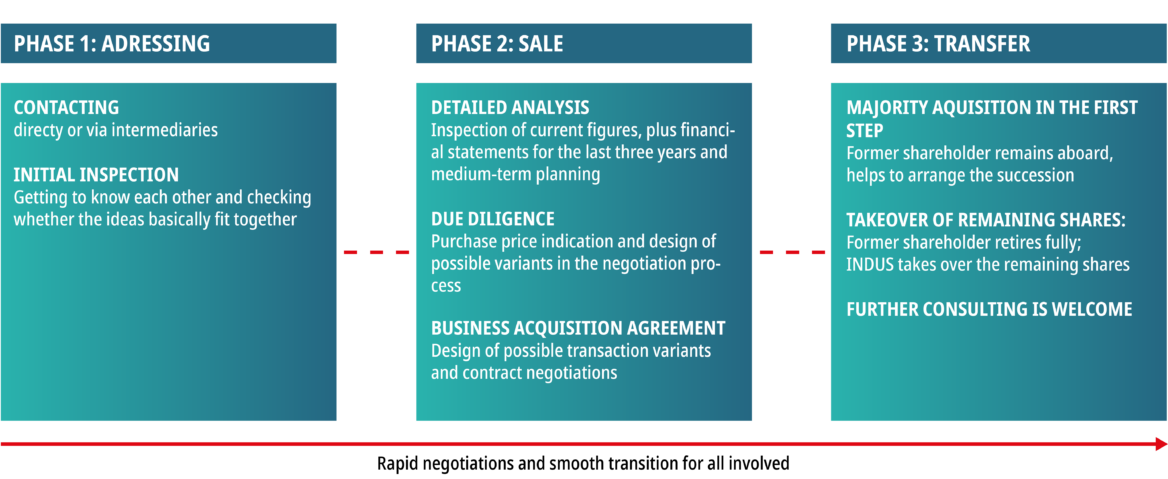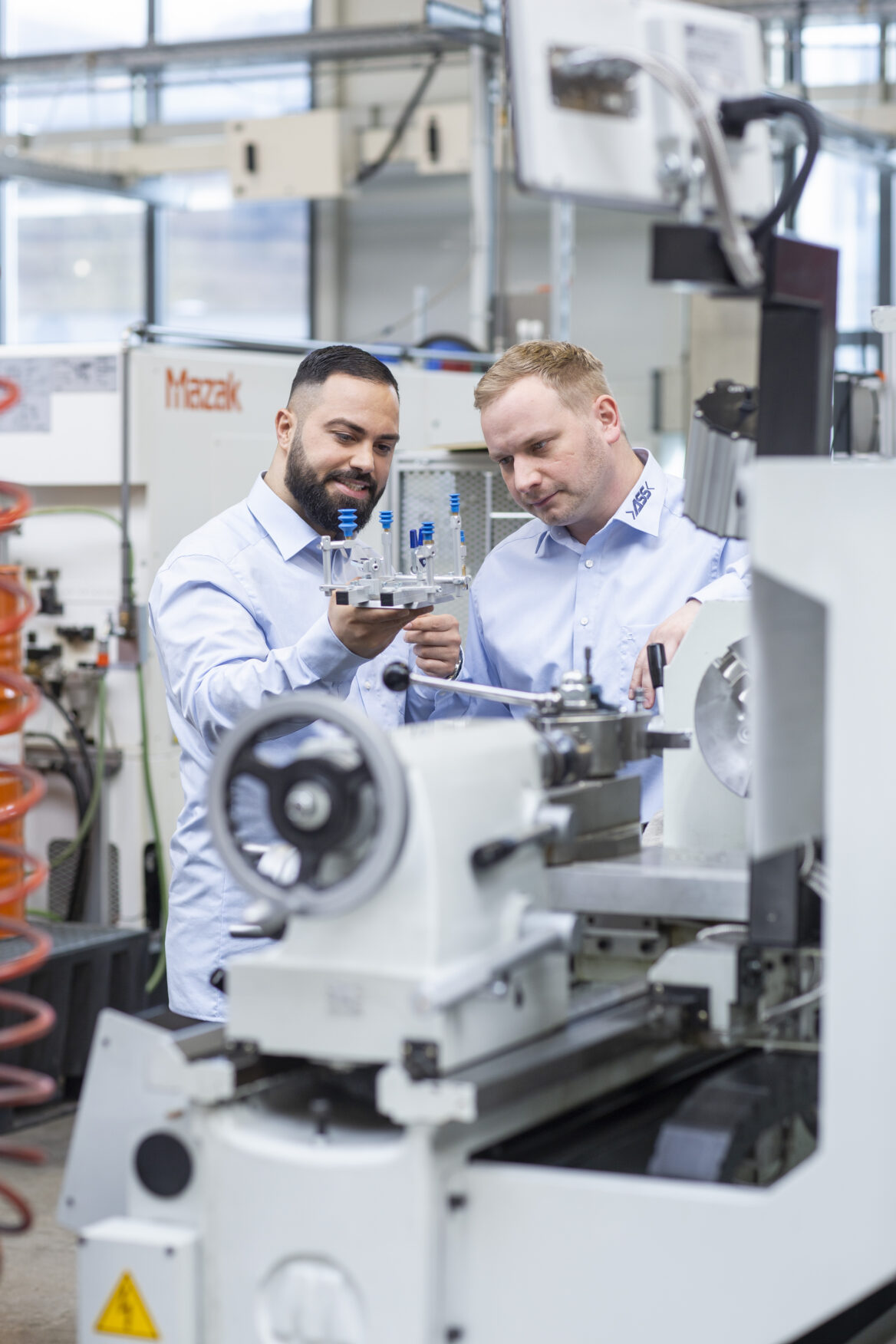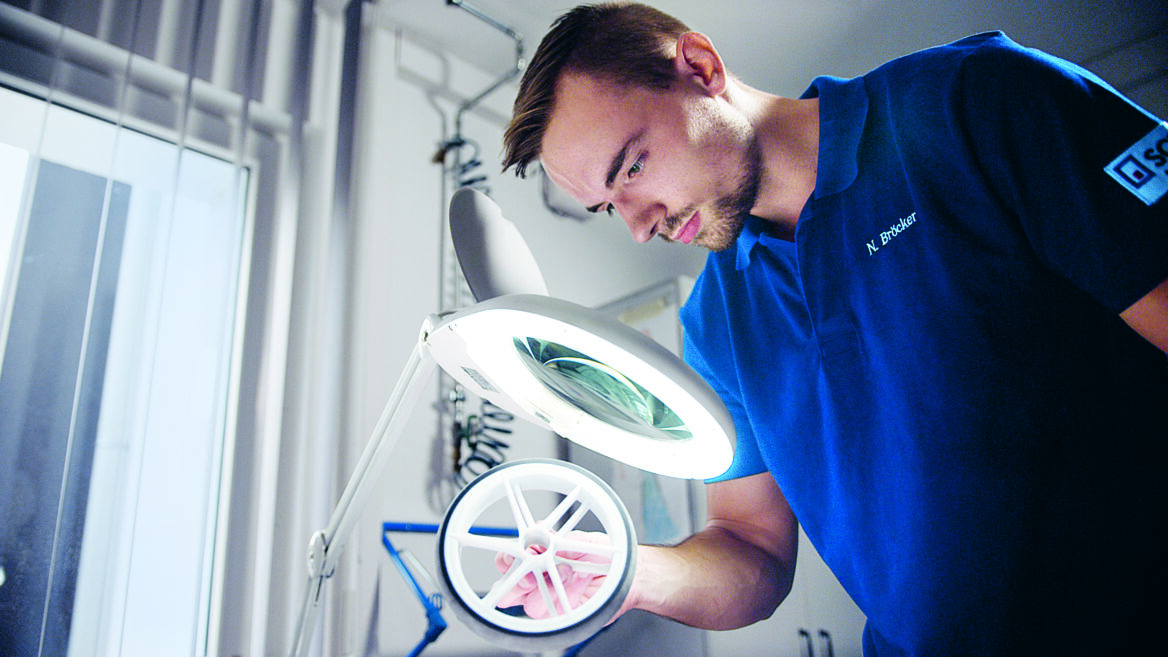Buy, Hold & Develop: M&A at INDUS

Rapid negotiations and smooth transition for all involved
Overview: A three-phase process
Our sale process usually consists of three phases. The first is “initial contact and thorough inspection” – we get to know each other as buyer and seller and get an idea of whether we’re basically on the same page.

As soon as both parties indicate a serious interest, the actual sale process begins. The company’s management has direct contact with the people that they will deal with over the course of the process. We are discreet in our discussions; any information is exchanged confidentially.
We pay particular attention to the third phase, the transition to new responsibilities. It is our aim to transfer responsibilities as inconspicuously and smoothly as possible. The existing shareholders play a vital role here by sharing their experience and intuition with their successors.
The most important answers
How long does the transaction process take?
Once the decision has been made to transfer the company to INDUS and the sale process can be initiated, the length of time that passes until the contract is completed is three to six months. The prerequisite for this is that all financial, legal and other information necessary for determining a serious purchase price is available as quickly as possible after the start of the detailed negotiations.
How do we traditionally reach an agreement?

As soon as both sides have decided that they would like to come to an agreement, we make an initial non-binding offer to the shareholder. This offer is based on the company’s economic figures, our estimate of market potential and our experience.
For the binding offer we create a company valuation based on the detailed information that we exchange with one another. We perform this due diligence rapidly and without additional checks from financing banks.
Once the price has been agreed, we draft the purchase contract together. This contract is created taking into account the seller’s tax and legal requirements.
Once the contract is signed and closed following approval from the antitrust agency, we pay the purchase price within ten working days.
“There is a right price for everything” and this is why we do not participate in bidding wars that aim to achieve the highest price. We aim for a fair price that allows us to ensure we can fulfill the promises that we make to the company being purchased.
When does coming to an agreement become difficult from INDUS’ point of view?

The three criteria that are most important to us are “core skills,” “stability,” and “company potential.” These are vital for us and we will not compromise in these areas. It is also very important to us that the company can operate largely autonomously once it is part of the Group. We also place managers at the head of our portfolio companies that we fully trust.
It is important for a company’s future success that it lets go of all sorts of issues that are weighing it down. That is why we ensure at the time of ownership transition that old topics or risks no longer burden the company in its new setting.
Our corporate philosophy means we are not the correct partner for traditional turnarounds and start-ups or minority interests. Furthermore we do not acquire any companies in the arms, luxury food or gambling industries. In addition, we are not planning any acquisitions in connection with the extraction of fossil fuels.
How keeps INDUS the corporate culture intact?

The short answer: “Through freedom.” Any culture, but especially one that is focused on development, needs space to breathe. That is why we do not interfere with the structures, processes or habits of our companies. Our only and central connection to the companies are the managing directors.
The most important impact we have on the culture is providing the managing directors with a regular reminder of their entrepreneurial spirit and keeping up their motivation for their high-responsibility positions. We hold direct talks on site and bring all of our managing directors together at least once a year at meetings and informal events.
Listing on the stock exchange: How much of an impact does this have on our behavior towards individual companies?

None. We pursue our SME-oriented business approach regardless of where our capital originates. To ensure that stays this way in future, we have teamed up with Versicherungskammer Bayern, an important anchor investor who shares our long-term objectives.
Our most important shareholders also include former owners of companies who now operate successfully within the INDUS Group.
Will INDUS still be as dedicated to its SME promises in 20 years?
Absolutely. Everything that the management of INDUS does is intended to ensure the continuation of its unique business model. In its 30-year history, INDUS has established a foundation that gets stronger with each passing year. And the past few years have shown that this business model is successful even in difficult times.


